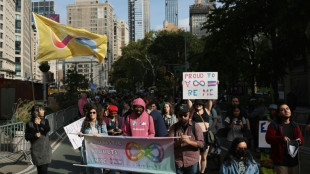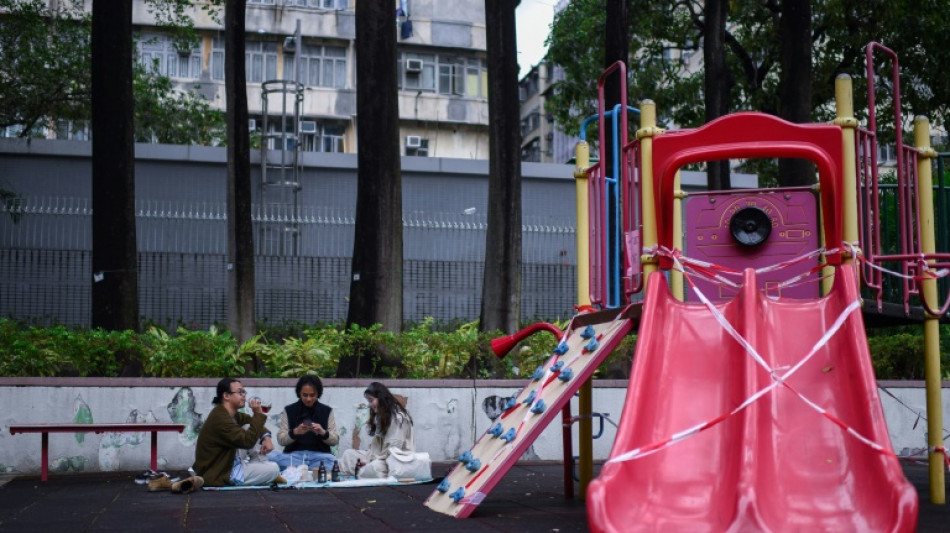
-
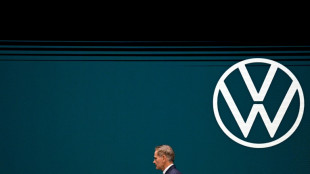 Volkswagen posts 1-billion-euro loss on tariffs, Porsche woes
Volkswagen posts 1-billion-euro loss on tariffs, Porsche woes
-
'Fight fire with fire': California mulls skewing electoral map
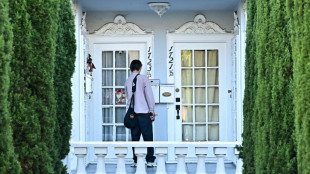
-
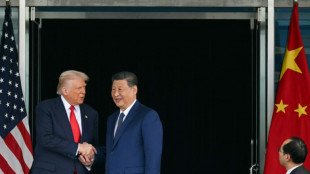 Fentanyl, beans and Ukraine: Trump hails 'success' in talks with Xi
Fentanyl, beans and Ukraine: Trump hails 'success' in talks with Xi
-
'Nowhere to sleep': Melissa upends life for Jamaicans
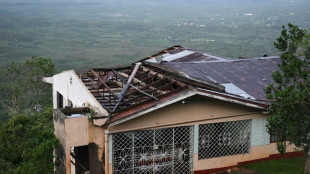
-
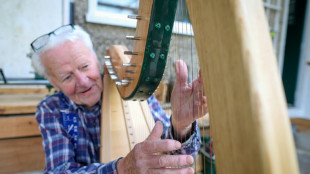 Irish octogenarian enjoys new lease on life making harps
Irish octogenarian enjoys new lease on life making harps
-
Tanzania blackout after election chaos, deaths feared

-
 G7 meets on countering China's critical mineral dominance
G7 meets on countering China's critical mineral dominance
-
Trump hails tariff, rare earth deal with Xi
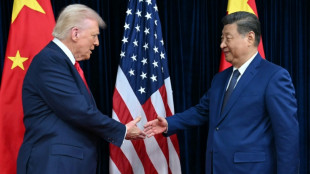
-
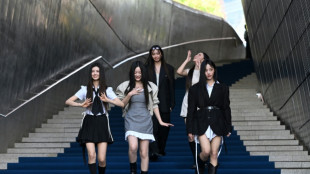 Court rules against K-pop group NewJeans in label dispute
Court rules against K-pop group NewJeans in label dispute
-
India's Iyer says 'getting better by the day' after lacerated spleen

-
 Yesavage fairytale carries Blue Jays to World Series brink
Yesavage fairytale carries Blue Jays to World Series brink
-
Bank of Japan keeps interest rates unchanged

-
 Impoverished Filipinos forge a life among the tombstones
Impoverished Filipinos forge a life among the tombstones
-
Jokic posts fourth straight triple-double as Nuggets rout Pelicans

-
 UN calls for end to Sudan siege after mass hospital killings
UN calls for end to Sudan siege after mass hospital killings
-
Teenage Australian cricketer dies after being hit by ball

-
 As Russia advances on Kupiansk, Ukrainians fear second occupation
As Russia advances on Kupiansk, Ukrainians fear second occupation
-
Trade truce in balance as Trump meets 'tough negotiator' Xi

-
 China to send youngest astronaut, mice on space mission this week
China to send youngest astronaut, mice on space mission this week
-
Yesavage gem carries Blue Jays to brink of World Series as Dodgers downed

-
 With inflation under control, ECB to hold rates steady again
With inflation under control, ECB to hold rates steady again
-
Asia stocks muted with all eyes on Trump-Xi meeting

-
 Personal tipping points: Four people share their climate journeys
Personal tipping points: Four people share their climate journeys
-
Moto3 rider Dettwiler 'no longer critical' after crash: family

-
 US economy in the dark as government shutdown cuts off crucial data
US economy in the dark as government shutdown cuts off crucial data
-
Trump orders nuclear testing resumption ahead of Xi talks

-
 'Utter madness': NZ farmers agree dairy sale to French group
'Utter madness': NZ farmers agree dairy sale to French group
-
Samsung posts 32% profit rise on-year in third quarter

-
 30 years after cliffhanger vote, Quebec separatists voice hope for independence
30 years after cliffhanger vote, Quebec separatists voice hope for independence
-
Taxes, labor laws, pensions: what Milei wants to do next

-
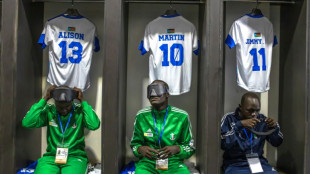 South Sudan's blind football team dreams of Paralympic glory
South Sudan's blind football team dreams of Paralympic glory
-
US says 4 killed in new strike on alleged Pacific drug boat
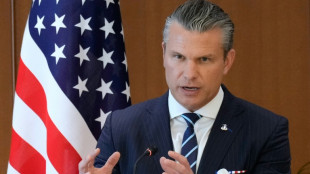
-
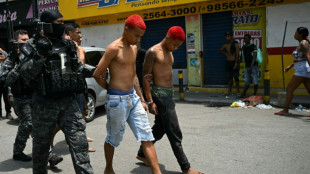 What we do and don't know about Rio's deadly police raid
What we do and don't know about Rio's deadly police raid
-
'They slit my son's throat' says mother of teen killed in Rio police raid
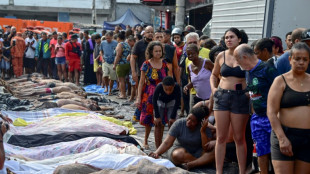
-
 Arteta hails 'special' Dowman after 15-year-old makes historic Arsenal start
Arteta hails 'special' Dowman after 15-year-old makes historic Arsenal start
-
Google parent Alphabet posts first $100 bn quarter as AI fuels growth
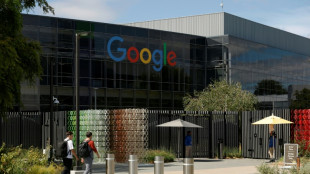
-
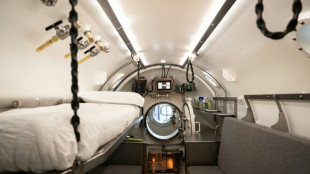 Underwater 'human habitat' aims to allow researchers to make weeklong dives
Underwater 'human habitat' aims to allow researchers to make weeklong dives
-
Maresca slams Delap for 'stupid' red card in Chelsea win at Wolves

-
 'Non-interventionist' Trump flexes muscles in Latin America
'Non-interventionist' Trump flexes muscles in Latin America
-
Slot defends League Cup selection despite not meeting 'Liverpool standards'

-
 'Poor' PSG retain Ligue 1 lead despite stalemate and Doue injury
'Poor' PSG retain Ligue 1 lead despite stalemate and Doue injury
-
Liverpool crisis mounts after League Cup exit against Palace

-
 Kane scores twice as Bayern set European wins record
Kane scores twice as Bayern set European wins record
-
Radio Free Asia suspends operations after Trump cuts and shutdown

-
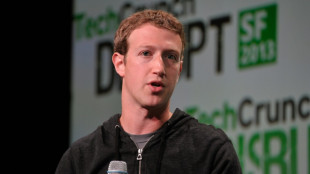 Meta shares sink as $16 bn US tax charge tanks profit
Meta shares sink as $16 bn US tax charge tanks profit
-
Dollar rises after Fed chair says December rate cut not a given
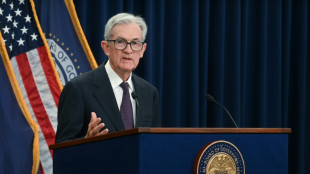
-
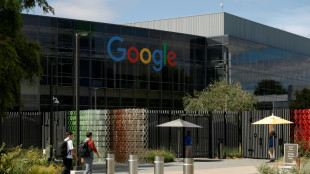 Google parent Alphabet posts first $100 bn quarter as AI drives growth
Google parent Alphabet posts first $100 bn quarter as AI drives growth
-
Rob Jetten: ex-athlete setting the pace in Dutch politics
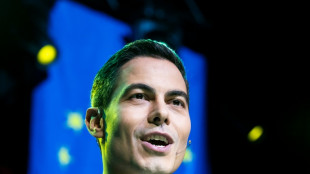
-
 Juve bounce back after Tudor sacking as Roma keep pace with leaders Napoli
Juve bounce back after Tudor sacking as Roma keep pace with leaders Napoli
-
Favorite Sovereignty scratched from Breeders' Cup Classic after fever
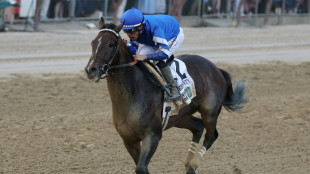

Hong Kongers picnic to avoid Covid-tracing app
When Hong Kong made a Covid check-in app mandatory at restaurants, friends Birdy and Bu -- wary of government tracking -- decided to avoid eateries entirely and go for picnics instead.
The idea caught fire: their private social media picnic group has swelled from 50 in December to more than 6,000 members, as many look to avoid sharing data in a city where distrust of the Beijing-backed authorities runs deep.
Instead of scanning QR codes at restaurants with the government's "Leave Home Safe" app, they simply order takeaway and find spots to eat with friends.
"I just don't like being forced," Birdy told AFP over a weekend picnic with Bu and another friend Dominic at a small park, their food and drinks neatly arranged on a blanket next to a playground.
Birdy and Bu -- who declined to share their full names over safety concerns -- named their picnic group "Leave Home Wild".
Hong Kong has kept the coronavirus at bay with a relatively tiny Covid caseload, thanks to some of the world's strictest border controls and social distancing requirements.
In December, the government made it compulsory for all adults under 65 to log their presence at various public venues -- including eateries, cinemas and gyms -- with the official app.
Similar apps have been deployed around the world during the pandemic.
But in Hong Kong, acceptance of the technology is unavoidably linked with the public's relationship with the authorities.
"I am so frustrated," one user wrote in the picnic group. "But I will never scan that code for eating inside a restaurant."
- A 'problematic' app -
Hong Kong is in the grip of a crackdown on dissent, with China remoulding the city in its own authoritarian image following the huge and sometimes violent democracy protests of 2019.
The clampdown has snuffed out protests but public trust in the government has plummeted to historic lows, complicating the fight against the pandemic.
This distrust was among the factors blamed for the city's sluggish take-up of Covid vaccines -- for many, not getting a shot was a way to thumb their noses at the government.
It has come into play with the Covid tracking app too -- fears have swirled about how the information it collects will be used, despite assurances about data security from the authorities.
Some are particularly concerned about how the app links with the far more intrusive tracking system in mainland China.
"I think the app is quite problematic, especially given the current political circumstances in Hong Kong," said data protection specialist Kwong Chung-ching.
"The source code... has never been open for us so there is no way for people to check where data goes and how it operates."
Currently, Leave Home Safe stores information linked to phone numbers instead of names. It does not track the users' location, instead relying on the QR code check-ins to determine where they have been.
Users are informed through the app if they were at a venue where the virus was detected.
However, those logs will be shared with Chinese authorities when people use a special Hong Kong health code to travel to the mainland.
That code requires real names, phone numbers, IDs and home addresses.
- 'Lying flat' -
Despite the privacy concerns, Hong Kong is pressing ahead with the tech.
Last month, it said the Leave Home Safe app would double as a vaccine pass, with a valid Covid inoculation record becoming a requirement for many public venues.
Failure to comply with check-in rules at locations such as restaurants can carry fines as high as HK$5,000 (US$640) for customers, and could land owners in jail for up to six months with a maximum fine of HK$50,000.
Authorities in Hong Kong have shown little tolerance for dissent, and with a "patriots only" electoral system in place, there is negligible push-back to the government in the legislature.
Those avoiding the app are keen to steer clear of the "resistance" label.
Instead of standing up to authorities, co-founder Bu said they are "lying flat" -- the first rule in their group is members should not urge others to boycott the app.
"People can neither express their concerns via elected legislators nor protest and rally on streets," he said.
"What other choice is left except for not participating?"
As the app becomes a necessity at more places, it is uncertain how long they can avoid it.
Bu and Dominic said they bought separate phones solely for the app.
But Birdy said she will avoid it for as long as she can -- a position that has meant she cannot attend her best friend's wedding reception.
"What kind of relationship do I have with the government that allows it to track me so closely?"
H.Seidel--BTB




